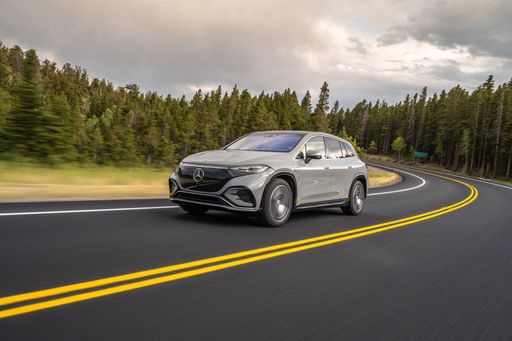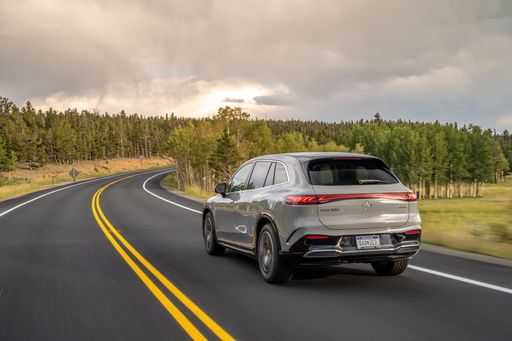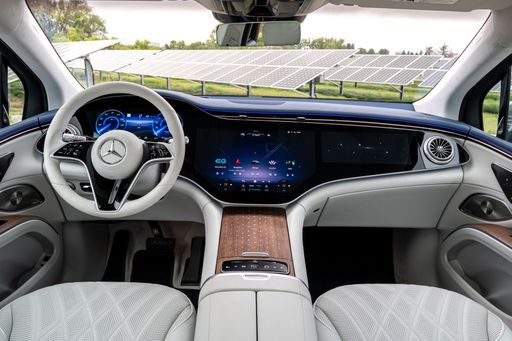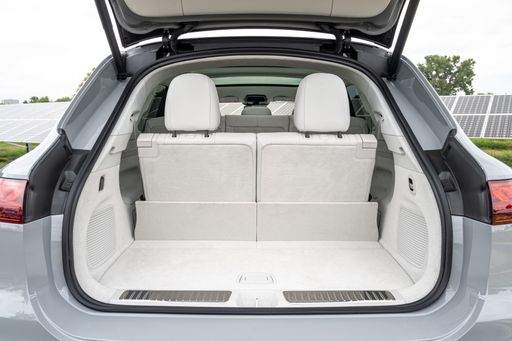Mercedes EQS SUV vs Tesla Model X - Differences and prices compared
Compare performance (658 HP vs 1020 HP), boot space and price (95000 £ vs 98600 £) at a glance. Find out which car is the better choice for you – Mercedes EQS SUV or Tesla Model X?
Costs and Efficiency:
Price and efficiency are often the first things buyers look at. Here it becomes clear which model has the long-term edge – whether at the pump, the plug, or in purchase price.
Mercedes EQS SUV has a hardly perceptible advantage in terms of price – it starts at 95000 £, while the Tesla Model X costs 98600 £. That’s a price difference of around 3590 £.
In terms of energy consumption, the advantage goes to the Tesla Model X: with 18.30 kWh per 100 km, it’s barely noticeable more efficient than the Mercedes EQS SUV with 19.60 kWh. That’s a difference of about 1.30 kWh.
As for range, the Mercedes EQS SUV performs minimal better – achieving up to 695 km, about 46 km more than the Tesla Model X.
Engine and Performance:
Power, torque and acceleration say a lot about how a car feels on the road. This is where you see which model delivers more driving dynamics.
When it comes to engine power, the Tesla Model X has a clearly perceptible edge – offering 1020 HP compared to 658 HP. That’s roughly 362 HP more horsepower.
In acceleration from 0 to 100 km/h, the Tesla Model X is convincingly quicker – completing the sprint in 2.60 s, while the Mercedes EQS SUV takes 4.40 s. That’s about 1.80 s faster.
In terms of top speed, the Tesla Model X performs slightly better – reaching 262 km/h, while the Mercedes EQS SUV tops out at 210 km/h. The difference is around 52 km/h.
Space and Everyday Use:
Cabin size, boot volume and payload all play a role in everyday practicality. Here, comfort and flexibility make the difference.
Both vehicles offer seating for 5 people.
In curb weight, Tesla Model X is somewhat lighter – 2348 kg compared to 2695 kg. The difference is around 347 kg.
In terms of boot space, the Mercedes EQS SUV offers noticeable more room – 645 L compared to 425 L. That’s a difference of about 220 L.
In maximum load capacity, the Tesla Model X performs noticeable better – up to 2675 L, which is about 575 L more than the Mercedes EQS SUV.
When it comes to payload, Mercedes EQS SUV barely noticeable takes the win – 570 kg compared to 527 kg. That’s a difference of about 43 kg.
Who wins the race?
The Tesla Model X proves to be is largely superior and therefore becomes our DriveDuel Champion!
Tesla Model X is the better all-rounder in this comparison.

Tesla Model X
Costs and Consumption
View detailed analysis
Engine and Performance
View detailed analysis
Dimensions and Body
View detailed analysis
Mercedes EQS SUV
The Mercedes EQS SUV blends limousine-level quiet and luxury with the commanding presence of an SUV, wrapping passengers in sumptuous materials and a futuristic, screen-dominated cabin. It drives with serene confidence and delivers the kind of effortless refinement that makes city commutes and long trips feel like first-class experiences — just be prepared for attention wherever you park it.
details



Tesla Model X
The Model X stands out in the electric SUV market with its striking falcon-wing doors and spacious interior, providing both style and practicality. Its exceptional range and impressive performance make it a standout choice for environmentally-conscious drivers seeking a luxurious experience. With advanced technology features and a strong focus on safety, the Model X redefines what an electric vehicle can be.
details

|
|
|
|
|
Costs and Consumption |
|
|---|---|
|
Price
95000 - 212100 £
|
Price
98600 - 107100 £
|
|
Consumption L/100km
-
|
Consumption L/100km
-
|
|
Consumption kWh/100km
19.6 - 21.9 kWh
|
Consumption kWh/100km
18.3 - 19.3 kWh
|
|
Electric Range
615 - 695 km
|
Electric Range
609 - 649 km
|
|
Battery Capacity
108.4 - 118 kWh
|
Battery Capacity
-
|
|
co2
0 g/km
|
co2
0 g/km
|
|
Fuel tank capacity
-
|
Fuel tank capacity
-
|
Dimensions and Body |
|
|---|---|
|
Body Type
SUV
|
Body Type
SUV
|
|
Seats
4 - 5
|
Seats
5
|
|
Doors
5
|
Doors
5
|
|
Curb weight
2695 - 3075 kg
|
Curb weight
2348 - 2470 kg
|
|
Trunk capacity
440 - 645 L
|
Trunk capacity
425 L
|
|
Length
5125 mm
|
Length
5036 mm
|
|
Width
1959 - 2034 mm
|
Width
1999 mm
|
|
Height
1718 - 1721 mm
|
Height
1684 mm
|
|
Max trunk capacity
2100 L
|
Max trunk capacity
2675 L
|
|
Payload
425 - 570 kg
|
Payload
500 - 527 kg
|
Engine and Performance |
|
|---|---|
|
Engine Type
Electric
|
Engine Type
Electric
|
|
Transmission
Automatic
|
Transmission
Automatic
|
|
Transmission Detail
Reduction Gearbox
|
Transmission Detail
Reduction Gearbox
|
|
Drive Type
All-Wheel Drive, Rear-Wheel Drive
|
Drive Type
All-Wheel Drive
|
|
Power HP
360 - 658 HP
|
Power HP
670 - 1020 HP
|
|
Acceleration 0-100km/h
4.4 - 6.8 s
|
Acceleration 0-100km/h
2.6 - 3.9 s
|
|
Max Speed
210 km/h
|
Max Speed
240 - 262 km/h
|
|
Torque
568 - 950 Nm
|
Torque
-
|
|
Number of Cylinders
-
|
Number of Cylinders
-
|
|
Power kW
265 - 484 kW
|
Power kW
493 - 750 kW
|
|
Engine capacity
-
|
Engine capacity
-
|
General |
|
|---|---|
|
Model Year
2024
|
Model Year
2025
|
|
CO2 Efficiency Class
A
|
CO2 Efficiency Class
A
|
|
Brand
Mercedes-Benz
|
Brand
Tesla
|
Is the Mercedes EQS SUV offered with different drivetrains?
The Mercedes EQS SUV is available as All-Wheel Drive or Rear-Wheel Drive.
The prices and data displayed are estimates based on German list prices and may vary by country. This information is not legally binding.
